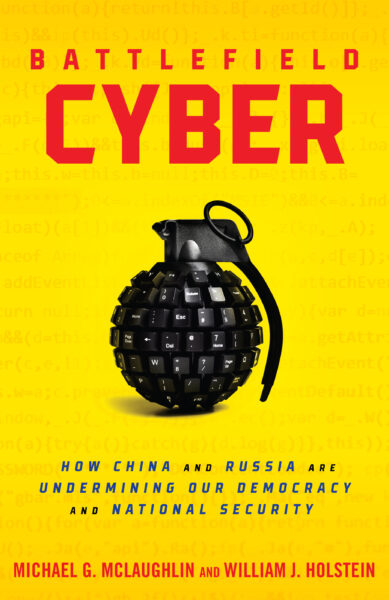 I’m delighted to report that Kirkus Review, a publishing industry powerhouse, has given a starred review to Battlefield Cyber: How China and Russia Are Undermining Our Democracy and National Security. One of the most coveted designations in the book industry, Kirkus says its star “marks books of exceptional merit.”
I’m delighted to report that Kirkus Review, a publishing industry powerhouse, has given a starred review to Battlefield Cyber: How China and Russia Are Undermining Our Democracy and National Security. One of the most coveted designations in the book industry, Kirkus says its star “marks books of exceptional merit.”
The key takeaway line is this: “A disturbing, well-rendered study that reveals the extent of the digital struggle and charts a way forward for the U.S.” Battlefield Cyber is a “pertinent exploration of how cyberspace combat has become a dangerous reality.”
Here is the rest of the review:
BATTLEFIELD CYBER
HOW CHINA AND RUSSIA ARE UNDERMINING OUR DEMOCRACY AND NATIONAL SECURITY
“Make no mistake, America’s adversaries are fully engaged in a cyber war,” write the authors, “and it is raging all around us.”
This initially sounds like hyperbole, but as the narrative unfolds, it begins to seem like an understatement.
McLaughlin is a former senior adviser for U.S. Cyber Command, where he was responsible for the coordination of Department of Defense counterintelligence operations in cyberspace, and Holstein is a journalist who specializes in technology and China.
The authors make a strong argument that Russia and China are winning an insidious digital war against the U.S. They explain how hacks, malware, and system penetrations work, dissecting some of the major incidents. Russia is mainly concerned with disruption, and its government has coopted hackers specializing in ransomware attacks into their operations. The Russian invasion of Ukraine was preceded by cyberattacks on the country’s communications systems and infrastructure, which were remarkably effective. China is more interested in colonizing American systems to insert malware, steal intellectual property, and gather personal data. Both countries have penetrated social media platforms and have established a covert presence in cloud systems.
McLaughlin and Holstein propose moves to improve digital security in the U.S., looking to Taiwan as a model for cooperation between government and the private sector. A Department of Digital Services could provide coordination and support as well as pushing tech companies to move their operations out of China. Corporations have to be willing to share information and protective technology, and there must be a concerted effort to remove embedded malware from systems in companies, government agencies, and the military. McLaughlin and Holstein present a convincing case in clear language, and the result is a book that is likely to keep you awake at night.
See the review here. And the book can be pre-ordered on Amazon.com or Barnes & Noble.




